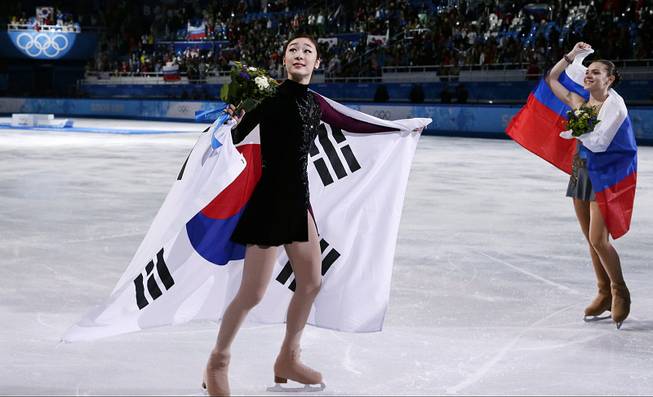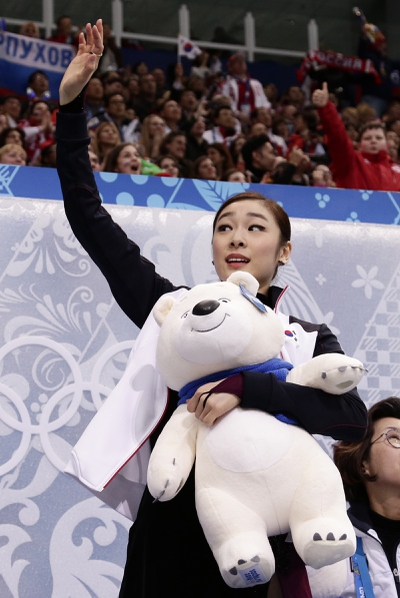
Bernat Armangue / AP
Yuna Kim of South Korea and Adelina Sotnikova of Russia skate on the ice after the flower ceremony for the women’s free skate figure skating finals at Iceberg Skating Palace during the 2014 Winter Olympics, Thursday, Feb. 20, 2014, in Sochi, Russia.
Thursday, Feb. 20, 2014 | 10:45 p.m.
SOCHI, Russia — Many expected a Russian to win a gold medal in women’s figure skating at the Sochi Games, but hardly anyone expected that it would be Adelina Sotnikova.
Overlooked by her country earlier at the Olympic team event, Sotnikova, 17, waited patiently for the singles competition and delivered a sophisticated and aggressive performance Thursday to score a major upset over the 2010 champion, Yuna Kim of South Korea.
In the subjective world of figure skating, which is governed by an opaque judging system and a complicated scoring system not easily understood by casual fans, the outcome fostered immediate debate.
Sotnikova landed seven triple jumps to six for Kim and won the long program with 149.95 points. She finished with 224.59 overall points and became the first Russian or Soviet woman to win an individual gold medal.
Even with her grace, maturity, composure and soaring jumping ability, Kim led by less than a point after Wednesday’s short program. On Thursday, she skated a poised and flowing tango routine and finished with 144.19 points in the long program.
Still, her routine was not the most athletically challenging. Sotnikova scored higher on the technical merit of her program. For instance, Kim did not attempt a triple loop or a double axel, triple toe loop combination, as Sotnikova did.
Also, Kim did not receive the highest level for her step sequence or her layback spin. She took the silver medal with 219.11 collective points.
“It was totally fair,” said Elvis Stojko, a two-time Olympic silver medalist from Canada. “Adelina was ready. Kim didn’t have enough technical ammunition.”
Sotnikova’s skating appears tailor made for the current scoring system, a kind of scavenger hunt for accumulated points that, some experts have complained, favors mathematics at the expense of artistry.
The former 6.0 system was replaced after a vote trading-scandal by judges discredited the pairs and ice-dancing competitions at the 2002 Winter games in Salt Lake City.
In the current scoring system, each jump and spin and footwork sequence is assigned a numerical value, like a cholesterol count. Artistic marks such as performance, choreography and musical interpretation are also given a numerical value in an attempt to make the sport more objective.
The difference in Thursday’s long program was more than 5 1/2 points - about four points in the base numerical value of Sotnikova’s technical elements and about two points in the quality of how they were performed.
While Sotnikova’s skating is not as aesthetically pleasing as Kim’s, her athletic style “checks off every box” and “does everything the judges are looking for,” said Scott Hamilton, the 1984 Olympic champion.
“I have to look at it and respect it,” Hamilton said of Thursday’s result.
Not everyone agreed. Ashley Wagner of the U.S., who finished seventh, criticized the judging system in which scores are given anonymously, saying she was left “speechless” by the outcome.
A number of international skaters, coaches and officials have said the anonymity of the judges undermines the sport’s transparency and credibility. Judges, who are appointed by their national skating federations, lack independence. Scandal is commonplace, as are apparent conflicts of interest.
One of the judges in the women’s competition, Yuri Balkov of Ukraine, was at the center of an ice-dancing scandal at the 1998 Winter games in Nagano, Japan, when he was reportedly recorded by a Canadian judge trying to predetermine the outcome.
Another judge, Alla Shekhovtsova of Russia, is the wife of Valentin Piseev, who was formerly president of the Russian figure skating federation and is now its general director.
Because the high and low marks are tossed out for each skater, it is impossible to know which judges’ marks counted toward the final score in the women’s competition.
No referee or judge involved in Thursday’s decision was immediately made available to explain the outcome.
“It’s confusing and we need to make it clear for people,” Wagner said. “I’m speechless. This sport needs to be held accountable if it wants more people to believe in it.”
Dick Button, a two-time Olympic champion, said in a telephone interview that it was “flagrant hypocrisy” to have a judge like Balkov still judging figure skating.
The basic problem with the judging system, Button said, is that “anyone can cheat. All the time. These kids work until they’re blue in the face and you think they would be given an honest and straightforward response.”
Carolina Kostner, 27, of Italy, overcame collapses at the past two Olympics to win the bronze medal. She skated joyously Thursday after falling three times in the long program at the 2010 Vancouver games and finishing 16th after completing only one triple jump.
Kim, who was the last competitor of the night, did not see the others perform. She was attempting to join only Sonja Henie of Norway (1928, 1932, 1936) and Katarina Witt of the former East Germany (1984, 1988) as successive women’s champions.
“The scores are given by the judges,” said Kim, who repeated that this would be her final Olympics. “I’m not in the right position to comment on it. There is nothing that will change with my words. The most important thing was to participate in these games.”
Kim did admit, though, that she was less driven to win a second gold medal than she had been to win her first, saying she had “no obvious goal.”
At the Vancouver games, Kim said, she felt she would “die for a gold medal in the Olympics. That desire, that strong wish, was not as present. The motivation was a problem, I think.”
On Thursday, Sotnikova’s only obvious mistake, a minor one, was a two-footed landing at the end of a triple-flip, double toe loop, double loop combination.
When she finished her four-minute routine, she put her hands to her face in realization that she might win the gold medal. But there were two Americans left to skate — Gracie Gold (who would finish fourth) and Wagner — before Kim took the ice.
“I realized I would be on the podium, but I didn’t know which medal,” Sotnikova said. When her score appeared on the scoreboard, she said, “I really didn’t believe my eyes, frankly speaking.”
Sotnikova’s victory confirmed Russia’s re-emergence in international figure skating after it failed to win a single gold medal for the first time in five decades at the 2010 Vancouver games.
It became the only country to have won every discipline in Olympic figure skating - the team event, pairs, men’s and women’s singles and ice dancing.
Earlier at the Sochi games, Russia won the team and pairs events, but those triumphs came with the expectation of being a favorite. It was a different story for Sotnikova.
Even though she is a four-time Russian champion, having won her first national title at age 12, Sotnikova had been overshadowed lately by a teammate, Julia Lipnitskaia, 15, whose unexpectedly quick ascent brought her the European championship last month.
Lipnitskaia performed the short and long program of the women’s portion of the Olympic team event. She became an international sensation with her flexibility and wondrous spins as Russia won the gold medal, while Sotnikova kept training out of the glare of publicity.
“I got really angry,” Sotnikova said of being omitted from the team event. “I decided I will get a medal in the individual event. I did it.”
On Wednesday, in the traditional women’s short program, Lipnitskaia fell on a triple flip and crashed into fifth place. She fell again in the long program and remained fifth overall.
Sotnikova buzzed around the ice during the short program with strength and energy in a performance to “Carmen.” She received a higher technical score than Kim and found herself in second place by less than a point.
The gold medal came 13 years after Sotnikova began skating in Moscow at age 4. In 2008, she became Russia’s national champion.
That a 12-year-old would be the best female skater in Russia was a sign that the country was still struggling athletically after the breakup of the Soviet Union in 1991. Rinks closed, government funding dried up, many coaches left the country and many parents did not have the disposable income to pay for skating lessons.
But Sotnikova’s early success also confirmed that, as the standard of living rose in Russia, a new group of top-flight young skaters had begun emerging.
Qualifying for the Olympics became her dream, but she was too young at 13, according to skating’s international rules, to compete in Vancouver.
“My second dream was to win the Olympics and I did,” Sotnikova said.


Join the Discussion:
Check this out for a full explanation of our conversion to the LiveFyre commenting system and instructions on how to sign up for an account.
Full comments policy